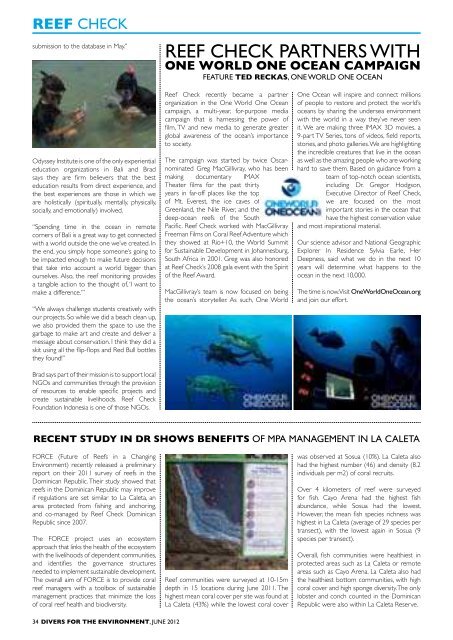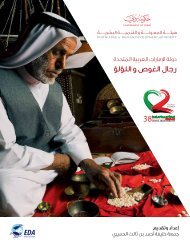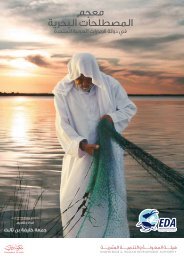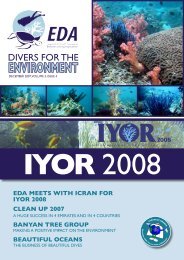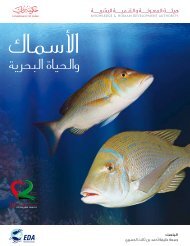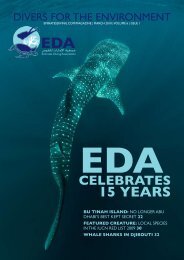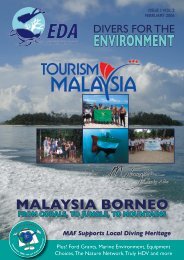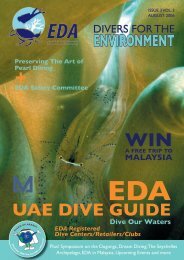Download - Emirates Diving Association
Download - Emirates Diving Association
Download - Emirates Diving Association
You also want an ePaper? Increase the reach of your titles
YUMPU automatically turns print PDFs into web optimized ePapers that Google loves.
REEF CHECK<br />
submission to the database in May.”<br />
Odyssey Institute is one of the only experiential<br />
education organizations in Bali and Brad<br />
says they are firm believers that the best<br />
education results from direct experience, and<br />
the best experiences are those in which we<br />
are holistically (spiritually, mentally, physically,<br />
socially, and emotionally) involved.<br />
“Spending time in the ocean in remote<br />
corners of Bali is a great way to get connected<br />
with a world outside the one we’ve created. In<br />
the end, you simply hope someone’s going to<br />
be impacted enough to make future decisions<br />
that take into account a world bigger than<br />
ourselves. Also, the reef monitoring provides<br />
a tangible action to the thought of, ‘I want to<br />
make a difference.’”<br />
“We always challenge students creatively with<br />
our projects. So while we did a beach clean up,<br />
we also provided them the space to use the<br />
garbage to make art and create and deliver a<br />
message about conservation. I think they did a<br />
skit using all the flip-flops and Red Bull bottles<br />
they found!”<br />
Brad says part of their mission is to support local<br />
NGOs and communities through the provision<br />
of resources to enable specific projects and<br />
create sustainable livelihoods. Reef Check<br />
Foundation Indonesia is one of those NGOs.<br />
FORCE (Future of Reefs in a Changing<br />
Environment) recently released a preliminary<br />
report on their 2011 survey of reefs in the<br />
Dominican Republic. Their study showed that<br />
reefs in the Dominican Republic may improve<br />
if regulations are set similar to La Caleta, an<br />
area protected from fishing and anchoring,<br />
and co-managed by Reef Check Dominican<br />
Republic since 2007.<br />
The FORCE project uses an ecosystem<br />
approach that links the health of the ecosystem<br />
with the livelihoods of dependent communities,<br />
and identifies the governance structures<br />
needed to implement sustainable development.<br />
The overall aim of FORCE is to provide coral<br />
reef managers with a toolbox of sustainable<br />
management practices that minimize the loss<br />
of coral reef health and biodiversity.<br />
REEF CHECK PARTNERS WITH<br />
ONE WORLD ONE OCEAN CAMPAIGN<br />
feature Ted Reckas, One World One Ocean<br />
Reef Check recently became a partner<br />
organization in the One World One Ocean<br />
campaign, a multi-year, for-purpose media<br />
campaign that is harnessing the power of<br />
film, TV and new media to generate greater<br />
global awareness of the ocean’s importance<br />
to society.<br />
The campaign was started by twice Oscarnominated<br />
Greg MacGillivray, who has been<br />
making documentary IMAX<br />
Theater films for the past thirty<br />
years in far-off places like the top<br />
of Mt. Everest, the ice caves of<br />
Greenland, the Nile River, and the<br />
deep-ocean reefs of the South<br />
Pacific. Reef Check worked with MacGillivray<br />
Freeman Films on Coral Reef Adventure which<br />
they showed at Rio+10, the World Summit<br />
for Sustainable Development in Johannesburg,<br />
South Africa in 2001. Greg was also honored<br />
at Reef Check’s 2008 gala event with the Spirit<br />
of the Reef Award.<br />
MacGillivray’s team is now focused on being<br />
the ocean’s storyteller. As such, One World<br />
One Ocean will inspire and connect millions<br />
of people to restore and protect the world’s<br />
oceans by sharing the undersea environment<br />
with the world in a way they’ve never seen<br />
it. We are making three IMAX 3D movies, a<br />
9-part TV Series, tons of videos, field reports,<br />
stories, and photo galleries. We are highlighting<br />
the incredible creatures that live in the ocean<br />
as well as the amazing people who are working<br />
hard to save them. Based on guidance from a<br />
team of top-notch ocean scientists,<br />
including Dr. Gregor Hodgson,<br />
Executive Director of Reef Check,<br />
we are focused on the most<br />
important stories in the ocean that<br />
have the highest conservation value<br />
and most inspirational material.<br />
Our science advisor and National Geographic<br />
Explorer In Residence Sylvia Earle, Her<br />
Deepness, said what we do in the next 10<br />
years will determine what happens to the<br />
ocean in the next 10,000.<br />
The time is now. Visit OneWorldOneOcean.org<br />
and join our effort.<br />
RECENT STUDY IN DR SHOWS BENEFITS OF MPA MANAGEMENT IN LA CALETA<br />
Reef communities were surveyed at 10-15m<br />
depth in 15 locations during June 2011. The<br />
highest mean coral cover per site was found at<br />
La Caleta (43%) while the lowest coral cover<br />
was observed at Sosua (10%). La Caleta also<br />
had the highest number (46) and density (8.2<br />
individuals per m2) of coral recruits.<br />
Over 4 kilometers of reef were surveyed<br />
for fish. Cayo Arena had the highest fish<br />
abundance, while Sosua had the lowest.<br />
However, the mean fish species richness was<br />
highest in La Caleta (average of 29 species per<br />
transect), with the lowest again in Sosua (9<br />
species per transect).<br />
Overall, fish communities were healthiest in<br />
protected areas such as La Caleta or remote<br />
areas such as Cayo Arena. La Caleta also had<br />
the healthiest bottom communities, with high<br />
coral cover and high sponge diversity. The only<br />
lobster and conch counted in the Dominican<br />
Republic were also within La Caleta Reserve.<br />
SCIGIRLS EPISODE<br />
WINS AN EMMY AWARD<br />
FEATURE Colleen Wisniewski<br />
Reef Check California<br />
Southern California Manager<br />
Reef Check California (RCCA) wins an<br />
Emmy Award! That’s probably not what you<br />
expected to hear, but it’s true (well actually I<br />
won the Emmy Award, but it wouldn’t have<br />
been possible without RCCA). We were<br />
part of the inaugural season of “SciGirls”, a<br />
series where viewers follow teams of middle<br />
school girls and their mentors as they create<br />
their own inquiry-based investigations of the<br />
environment, technology, engineering, animal<br />
behavior and health.<br />
We filmed our episode during August 2009<br />
with two sisters from Southern California<br />
named Meg and Elle, who are both snorkelers<br />
and scuba divers and have extensive experience<br />
on our local rocky reefs. The location for the<br />
shoot was Catalina Island Marine Institute at<br />
Toyon Bay (CIMI) where we spent three days<br />
exploring their laboratories and snorkeling and<br />
diving at various locations around the island,<br />
collecting data inside and outside a marine<br />
reserve. We developed a modified protocol to<br />
allow the girls to collect data while snorkeling<br />
from the surface. Our focus was on 7 indicator<br />
species instead of our usual 76 and the girls<br />
discovered that changes in the populations of<br />
indicator species are interconnected through<br />
predator/prey relationships on the reefs.<br />
Our Emmy Award is in the “New Approaches<br />
Daytime Children’s” category and was noted<br />
for its unique merging of television and<br />
the web. Episodes of SciGirls are still being<br />
broadcast on PBS stations around the United<br />
States. In addition, our episode (number 109:<br />
Ocean Ecosystems) is also available online at<br />
the SciGirls website in case you haven’t gotten<br />
a chance to see it. I recently received an official<br />
Emmy Award certificate from the National<br />
Academy of Arts and Sciences and it’s very<br />
exciting, but I’m still holding out for a golden<br />
mini-Emmy statuette for my desk!<br />
Sharks are an extremely diverse group of<br />
marine animals that can be found in various<br />
habitats worldwide. Sharks belong to the<br />
class Chondrichthyes, subclass Elasmobranchii<br />
that contains 12 orders of which three<br />
are extinct and 1100 species have been<br />
described. Chondrichthyes are cartilaginous<br />
fish characterized by the presence of five<br />
or more gill slits, paired fins, a true jaw and<br />
nostrils. There are approximately 500 shark<br />
species ranging in size from the 27cm pygmy<br />
sharkEuprotomicrus bispinatus to the 21m<br />
whale shark Rhincodon typus. Collectively,<br />
sharks have played an instrumental role in<br />
marine ecosystems for over 400 million years<br />
as evidenced by fossil records of the Devonian<br />
and possibly lower Silurian. However, because<br />
of their K-selected life history strategy (i.e. slow<br />
maturation and reproduction, producing few<br />
viable offspring) and increasing anthropogenic<br />
pressures they are extremely vulnerable<br />
and susceptible to overexploitation. Some<br />
estimates report that global shark populations<br />
have declined by as much as 80% within the<br />
last 20 years. Additionally, the International<br />
Union for Conservation of Nature (IUCN)<br />
Shark Specialist Group (SSG) lists 30% of<br />
shark and ray species as threatened or near<br />
threatened with extinction.<br />
Increased awareness about the impact of<br />
global shark fisheries, habitat destruction<br />
and the combined effects this will have on<br />
the marine environment and economy has<br />
improved collaborations between scientists,<br />
conservationists and government officials. The<br />
Bahamas National Trust (BNT), established in<br />
1959, is mandated with conserving both natural<br />
and historic resources in The Bahamas and is<br />
the only non-governmental organization in the<br />
world mandated to manage a country’s entire<br />
national park system. BNT’s vision is to create<br />
a comprehensive system of national parks<br />
and protected areas, with every Bahamian<br />
embracing environmental stewardship. This<br />
vision has driven and continues to drive<br />
the organization to establish new parks,<br />
engage in community outreach and promote<br />
conservation, education and research in The<br />
Bahamas.<br />
REEF CHECK<br />
REEF CHECK SPOTLIGHT:<br />
SHARK CONSERVATION IN THE BAHAMAS<br />
feature Krista Sherman<br />
GEF FSP Coordinator, Bahamas National Trust<br />
Bahamian shark populations are relatively<br />
healthy when compared to other parts of<br />
the world, which is due in part to the 1990s<br />
longline commercial fishing ban. However,<br />
to ensure that shark populations within<br />
The Bahamas remain healthy, in 2010 BNT<br />
partnered with the PEW Environment Group<br />
to launch a national “Protect the Sharks of The<br />
Bahamas” campaign to ban the commercial<br />
sale and trading of sharks and shark products<br />
within the country’s exclusive economic zone.<br />
The campaign launched in May 2010 with<br />
participants including government officials,<br />
representatives from NGOs, scientists, dive<br />
tour operators, conservationists, media<br />
and other key stakeholders. The benefits<br />
of maintaining diverse and abundant shark<br />
populations to sustain healthy ecosystems<br />
and the associated economic benefits through<br />
dive-related tourism (valued at approximately<br />
$78 million per annum to the Bahamian<br />
economy) were highlighted. BNT partnered<br />
with PEW and local NGOs to raise public<br />
awareness on the global status of sharks<br />
through education and outreach programmes.<br />
A series of presentations, public meetings,<br />
community walk-throughs and outreach<br />
through social network forums and the media<br />
occurred during 2010-2011. More than 5,600<br />
Bahamians signed handwritten petitions asking<br />
the government to “prohibit commercial<br />
fishing and selling of any shark or shark<br />
related products within the Commonwealth<br />
of The Bahamas”. In July 2011, the Bahamian<br />
Government created an amendment to<br />
the Fisheries Resources (Jurisdiction and<br />
Conservation) Act (Chapter 244) to prohibit<br />
commercial shark fishing along with the sale,<br />
importation and export of shark products<br />
within 630,000 km 2 (243,244 mi 2 ) of its waters.<br />
This marked another huge accomplishment<br />
for The Bahamas, which now protects over 40<br />
known shark species. Shelley Cant, BNT shark<br />
campaign manager stated, “This new legislation<br />
has established The Bahamas as the regional<br />
leader for shark conservation”.<br />
Decades of scientific research on sharks<br />
in The Bahamas has been used to assess<br />
their diversity and abundance and address<br />
deficiencies pertaining to their life history<br />
characteristics, diet, behaviour and distribution.<br />
Continued advancements in research<br />
combined with local capacity building, fisheries<br />
regulation enforcement and improved public<br />
awareness will lead to better conservation<br />
management. An ecosystem based approach<br />
will undoubtedly be most effective to sustain<br />
the diversity and function of sharks within<br />
marine ecosystems.<br />
34 DIVERS FOR THE ENVIRONMENT, JUNE 2012<br />
JUNE 2012, DIVERS FOR THE ENVIRONMENT 35


